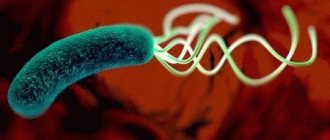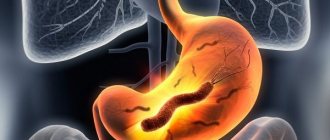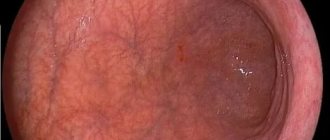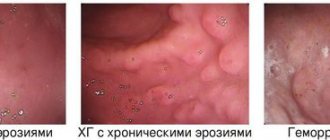The question “Is gastritis contagious?” cannot be answered unambiguously. Gastritis is an inflammation of the gastric mucosa, one of the causes of which may be infection. But for it to become active, certain conditions are needed, so not everyone gets sick.
It is not generally accepted that gastritis is transmitted from person to person. However, among the causes that cause it, Helicobacter pylori is especially noted. It can spread through food and utensils. Therefore, there is reason to consider the disease to be contagious.
What is Helicobacter pylori
This is a microorganism that can only live in the digestive tract. It has become so adapted to the aggressive action of hydrochloric acid that in its absence it does not even function. Any other microflora dies under the influence of gastric juice.
The bacterium was discovered in 1875 by a group of scientists in the mucous membrane of the human stomach. But then no one attached significance to the discovery and determined that the microorganism could cause infectious gastritis or ulcers. In subsequent years, Helicobacter was repeatedly discovered by doctors and researchers. Only in 1981 was a connection between inflammation and the activity of the microorganism established.
The bacterium lives in the intestines, oral cavity of humans and animals. It has the ability to undergo frequent mutations, which gives it special stability. Flagella on the surface provide the microorganism with the ability to actively move in the gastric mucus.
Helicobacter is considered one of the causes of gastritis. 95% of cases of chronic inflammation of the mucous membrane are associated with this bacterium. The microorganism interacts with hydrochloric acid and forms a protective ammonia cloud around itself. It is able to attach to cells, disrupting their nutrition. As a result, the mucous membrane is destroyed and the inflammatory process begins.
The bacterium actively multiplies, covering the entire surface of the stomach. It secretes a substance called urease, which damages the mucous membrane. Due to the properties of the shell, it is firmly attached to the walls of the organ.
The prevalence of the causative agent of gastritis in the world varies. For economically developed countries the figure is 30-40%. In African and Asian countries, it is found in 90% of people. Accordingly, the incidence of “contagious” gastritis is much higher here.
The main method for identifying Helicobacter pylori is a breath test. The ability of the microorganism to produce ammonia is used. Its amount is determined in the air that the patient exhales.
Routes of transmission
The bacterium is found in almost all patients with chronic gastritis. You can become infected with it through saliva. There are several routes of infection:
- airborne - sneezing, coughing;
- contact household - dishes, hygiene items;
- oral - kissing;
- medical - raw instruments.
The bacterium is quite heavy and cannot spread far in droplets of saliva. Therefore, infection from another person by coughing rarely occurs. A more likely route of infection is direct contact through kissing. The microorganism is detected on the surface of the tongue, teeth, and buccal mucosa.
Infection occurs when sharing hygiene items with a sick person. The bacterium can survive for several hours on dishes and food. If a person who suffers from gastritis uses a spoon and does not wash it, another person who also used this item gets an infection.
The risk of infection through medical instruments is negligible. This can happen when a gastric tube is inserted or during FGS. But all these devices are subject to sterilization, which kills the bacteria.
Helicobacter can also be transmitted through water. There she lives in another form, covered with a shell that increases its stability. You can become infected by drinking unboiled water, as well as fruits and vegetables washed with it.
For infection and the subsequent development of gastritis, a combination of several conditions is required - a large number of microbes in the patient’s saliva, close contact, a decrease in the immune defense of another person.
This is interesting: Treatment of intestinal candidiasis in children and adults: medications, folk remedies, diet
What's the result?
Based on the above data, gastritis is contagious. As modern medical research has shown, the causative agent of gastritis is the infectious bacterium Helicobacter pylori. The microbe is dangerous, under certain favorable factors it causes a lot of trouble, leading to the development of cancer in the patient. Most often, the bacterium does not cause any inconvenience to the host. In the modern world, every third person on the planet is infected with it, but not everyone develops gastritis. The phenomenon is accompanied by a number of factors.
Helicobacter is easily transmitted from a sick person to a healthy person. Transmission occurs through household contacts, kissing or intimate caresses. If a family member has been exposed to the disease, it is worth limiting his tactile contact with his family for a certain time.
In selected cases, gastritis is inherited. It is considered possible that the gene for predisposition to gastritis can be passed on from parents to children. You should pay close attention to your health if you have a family relative with stomach cancer or another gastrointestinal cancer. Living conditions and contact with infected people will seriously affect health. You should not refuse to take a test to detect Helicobacter pylori. As medical practice shows, proper treatment will help prevent a lot of unpleasant diseases in the future.
Gastritis is a complex disease that can be transmitted from a sick person to a healthy one. At the first symptoms, you must undergo a full course of examination by a doctor.
source
Is it possible to get gastritis - ways
Gastrodoudenitis is an infectious disease caused by Helicobacter pylori. Adults and children can easily become infected anywhere. Scientists say that the bacterium infects most of the world's population.
The microorganism is transmitted in the following ways:
- through common objects;
- by airborne droplets (saliva, close contact with an infected person);
- medical instrument;
- lack of personal hygiene.
Gastritis and kissing
The infection process is simple and easy. By kissing a child, spouse, or drinking tea from a sick person’s mug, the probability of contracting a Helicobacter pylori infection is 100%. Therefore, it is possible to get sick through a simple kiss.
Interesting fact! Statistics indicate that among the poor, infection occurs rapidly. Because of this, all family members suffer.
If close people have symptoms of gastritis, gastroenterologists advise everyone to be treated together. Otherwise, the risk of re-infection is high.
If one person in the family is infected, it is imperative to be tested for the presence of a pathogenic microorganism in order to prevent the development of inflammation.
If the bacteria is constantly present in the body, complications in the form of malignant tumors may occur. Gastritis is transmitted through kissing, which poses a danger to others.
Heredity and gastritis
When visiting a gastroenterologist, the doctor asks the question: does the patient have relatives with ulcers or stomach cancer? Doctors of science claim that it is possible to transmit a gene from parents that causes inflammation of the gastric mucosa. There is no need to worry or worry about this. The child will be predisposed to the appearance of gastritis.
You can prevent abdominal infection by:
- maintain a diet;
- use natural and environmentally friendly products;
- avoid the formation of stressful situations;
- get rid of bad habits.
Gastrodoudenitis is not directly inherited. Repeated infection in the family is possible through close contact with a sick person (kissing, eating food or drinks from the same container).
Neglect of health is the main factor in the development of stomach ulcers or the appearance of malignant tumors. At the first signs of gastritis in the family, you need to consult a doctor for examination and treatment. The earlier the disease is diagnosed, the faster the recovery. Then you don’t need to worry about heredity.
The information on our website is provided by qualified doctors and is for informational purposes only. Don't self-medicate! Be sure to consult a specialist!
Gastroenterologist, professor, doctor of medical sciences. Prescribes diagnostics and carries out treatment. Expert of the group for the study of inflammatory diseases. Author of more than 300 scientific papers.
doctor
What is infectious gastritis
Infectious and other gastritis is a long-lasting inflammation of the gastric mucosa, characterized by atrophic changes in the mucosa and impaired regeneration. If the disease is infectious and caused by Helicobacter, the disease develops and progresses quickly. However, the mere presence of bacteria in the human body is not enough. Often the bacterium is secretly present in the organ without showing itself. An infected person may not suspect that he is a carrier of a dangerous pathogen. As a rule, improper or unhealthy food, prolonged stress, bad habits or poor hygiene become a favorable environment for the activation and further proliferation of Helicobacter.
When infected, a special enzyme neutralizes the aggressive effects of stomach hydrochloric acid, and the bacteria begins to act actively. With the help of “antennae”, it cuts into the gastric mucosa and settles comfortably on the walls. The bacterium then captures and sucks nutrients from the mucosal cells, releasing harmful toxins into the body that destroy the protective lining of the stomach. When destroyed, the mucous membrane no longer protects the walls of the stomach from exposure to an acidic environment, and persistent inflammation occurs.
Symptoms of infectious gastritis are often similar to those of non-infectious gastritis. Minor manifestations of dyspeptic disorder or pronounced pain symptoms occur. Often the disease can be asymptomatic.
Transfer methods
Gastritis can be transmitted as an infectious disease only in one case - if the cause of its occurrence is Helicobacter pylori. This bacterium causes peptic ulcers of the stomach and duodenum. It was opened relatively recently - in 1982. The spread of peptic ulcers at the household level depends on the prevalence of this bacterium. If in developed countries the pathogen occurs with a 30-40% probability, then in developing countries it is more than 90%. In such countries, peptic ulcers occur in almost every resident.
The most common methods are consuming dirty food and water that are contaminated with bacteria. You can also get the causative agent of gastritis through contact with an infected carrier. This could be shared dishes, bed linen, personal hygiene products, and even a kiss. Many people become infected in infancy, receiving the bacteria from their mother's milk.
However, the entry of a pathogen into the human body does not guarantee the occurrence of gastritis or other pathology. The bacterium can live in “sleep mode” for many years and begin to multiply under comfortable conditions. Most often, this is an organism with reduced immunity and the ability to resist infection. This also includes people with an unhealthy lifestyle, lovers of alcohol, tobacco products and unhealthy food.
Another common misconception is that gastritis is inherited. It is not true. People mistakenly think that if parents had gastritis, then it was passed on to the child. In fact, the disease is not hereditary. Children become infected only if one of the parents is a carrier of Helicobacter pylori. Suppose one of the elders brought this bacterium into the house. Then he develops gastritis. Thus, all family members become infected. Some people also gradually develop gastritis. Therefore, it seems that the pathogen can be inherited, but this is not the case.
However, an important role in the development of such pathology is played by a hereditary tendency to diseases of the gastrointestinal tract.
The cause of gastritis is bacteria
The fact that gastritis is contagious, and the causative agent of the disease is a bacterium called Helicobacter Pylori, was proved by a scientist from Austria B. Marshall. Previously, the bacterium was recognized as a consequence of the disease, not the cause. An Austrian scientist, to prove his assumption, infected himself with a bacterium, and a few days later he discovered symptoms of gastritis.
Helicobacter has a high survivability - the bacterium lives in a very acidic environment, where other microorganisms are not able to survive. It attaches and parasitizes to the walls of the digestive system, including the stomach.
Is it possible to get gastritis? Definitely, if the cause of the disease is Helicobacter pylori. Statistics show that in 9 out of 10 cases, the nature of gastritis infection is infectious.
The World Health Organization has designated the bacterium a Group 1 carcinogen. This means that the infection is extremely dangerous and can not only cause gastritis, but also become a prerequisite for oncology of the stomach and duodenum.
Is it possible to get gastritis? Definitely, if the cause of the disease is Helicobacter pylori. Statistics show that in 9 out of 10 cases, the nature of gastritis infection is infectious.
Possible pathologies
Excessive salivation accompanies the following diseases:
- Narrowing of the esophagus, or stenosis. It can be caused by benign neoplasms, burns and mechanical damage to the mucous membrane, or a cancerous tumor. Stenosis is manifested by pain when swallowing food, heartburn, and vomiting after eating. The severity of symptoms depends on the stage of the disease.
- Peptic ulcer of the stomach and duodenum is a trophic disorder of the mucous membrane of the organ. Pathologies develop under the influence of infection, use of non-steroidal anti-inflammatory drugs, endocrine disorders and malignant tumors. If the ulcers are located on the gastric mucosa, pain occurs after eating; pain before eating indicates a duodenal ulcer. Additional symptoms are belching or heartburn with a sour taste, nausea and vomiting after eating.
- Acute gastritis is an inflammatory process in the gastric mucosa. It occurs as a reaction to a strong irritant - concentrated acids, alkalis, taking certain medications. It can develop against the background of infectious diseases or metabolic disorders. Characteristic signs are diarrhea, nagging pain in the pit of the stomach, and a white-gray coating on the tongue.
- Acute pancreatitis, or inflammation of the pancreas. In 70% of cases it occurs after drinking alcohol. Other factors that provoke inflammation include viral diseases, injuries, and previous surgeries. Acute pancreatitis is accompanied by bloating, nausea and vomiting, which does not bring relief.
- Worm infestation is a disease caused by the penetration of parasitic worms into the human body. They are more common in children and people with weakened immune systems. Helminthiasis is recognized by periodically occurring sharp pain in the abdomen and itching in the anus. Sometimes, while sleeping, an infected person begins to grind their teeth and clench their jaws.
- Heavy metal poisoning. At risk are employees of hazardous industries, as well as people living in environmentally polluted areas. Signs of poisoning are weakness, high fever, vomiting.
- Dental diseases – gingivitis, periodontal disease and periodontitis. Due to the presence of inflammatory processes in the oral cavity, pathogenic bacteria enter the salivary ducts and irritate them. Similarly, increased drooling may begin due to acute respiratory viral infections or tonsillitis.
The problem may not be increased saliva production, but a disruption of the mechanism of swallowing it. This indicates neurological disorders accompanied by paralysis and paresis of the facial muscles. If a person suddenly feels severe weakness, dizziness, numbness in half of the face, you need to call an ambulance - a stroke is possible.
source
Symptoms of viral gastritis
Its main symptoms are vomiting and diarrhea. Application: stomach pain, headache. The patient may also have a fever. Symptoms appear within one to two days and can last up to ten days. It depends on the type of virus that causes the disease.
Since the symptoms are similar to those of many other pathologies, the correct cause of the disease can only be determined through diagnostic tests, which are stool tests. Viral gastritis occurs in a fairly mild form, usually without complications, with the onset of a rapid complete recovery. The main danger is dehydration, but this is only a small category that cannot drink too much liquid. In this case, a secondary intestinal infection is possible.
Most treatment for viral gastritis is carried out at home under the supervision of a doctor, sometimes it can be sent to the hospital. The disease is contagious, viruses are easily transmitted by splashes of saliva. Products and objects can easily become infected with the virus if they are touched by a sick person. Improperly treated drinking water is also dangerous.
When to do an abdominal ultrasound?
What diseases can ultrasound diagnose? Pancreatitis, urolithiasis, cholecystitis, hepatitis, cirrhosis, benign and malignant tumors. An ultrasound examination is prescribed by a gastroenterologist if the patient complains of:
- sudden weight loss;
- abdominal pain;
- stool disorder;
- nausea after eating food;
- flatulence;
- heartburn.
You need to prepare for an ultrasound. Three days before the procedure, exclude from the diet foods that cause increased gas formation (whole-ground black bread, legumes, grains). You should come for an ultrasound scan on an empty stomach, and your last meal should be no later than 8 hours before the examination. Patients with diabetes are allowed to drink tea and eat one or two crackers for breakfast. Other patients need to undergo an ultrasound scan on an empty stomach.
This is interesting: What vitamins should you take to improve your liver health?
How is gastritis transmitted?
Today it is difficult to find a person who would not know about such a disease as gastritis. However, few people can answer whether it is contagious or not. It is generally accepted that this disease occurs as a result of irregular and poor-quality nutrition.
Also, a very common cause of gastritis is a prolonged stressful state. But there are many more reasons for this pathology. Among them there is one, due to which gastritis can be considered an infectious disease.
Therefore, you should not neglect the prevention and treatment of signs that indicate a disorder in the gastrointestinal tract.
The only way gastritis is infected is Helicobacter pylori. It can enter the body through contaminated food or drink.
Signs of the disease
Symptoms of gastritis vary depending on the type, but in rare cases the disease may be asymptomatic.
Along with pain, belching, heartburn and vomiting often appear. Bloating and persistent gas may occur.
To recognize pain caused specifically by gastritis, you must:
- Eat, preferably spicy and smoked food;
- Take certain medications or drink alcohol;
- Take a long break between meals.
The above indicators of pain are the most characteristic of this pathology. The remaining options are similar to the signs of other gastrointestinal diseases, and without proper clinical diagnosis, an error in diagnosis is possible.
Is gastritis inherited or through a kiss?
Gastroduodenitis, or more precisely the bacterium that caused it, can be infected through saliva, and therefore through a kiss. In the development of pathology, the hereditary factor is of great importance. This also causes the disease. Parents who have suffered from gastroduodenitis are able to pass on to their child a certain gene that provokes the development of pathology. After birth, the baby only has a tendency to develop gastritis, and not the disease itself. The progression of the pathology depends on many factors, including lifestyle, so it is not worth saying that the disease is necessarily inherited.
How does infection occur?
Knowing whether gastritis is contagious requires understanding how bacteria are transmitted. The disease can be transmitted:
- by airborne droplets;
- through medical devices;
- by using other people's personal hygiene items;
- through public objects.
Helicobacter can also be transmitted by people who do not even suspect that they are its carriers. The fact is that a microbe can exist in the human body for many years and not manifest itself in any way; it is believed that one can become infected even in early childhood. In order for its negative effects to manifest itself, special conditions in the body are necessary. In addition to bacterial infection, one or more of the following must be present:
- Weak immunity.
- Poor nutrition.
- Constant stress.
- Chronic inflammatory processes in other organs of the gastrointestinal tract, etc.
At the first manifestations of symptoms of gastritis, it is advisable to be tested for the presence of this microorganism, because if it became the cause of the disease, then it is likely that the patient is able to infect other people, most often members of his family.
The pathogen is easily transmitted through shared utensils. To become infected, it is enough to drink from the same mug as a sick person. Gastritis is also transmitted through kissing. A harmless expression of love from a child or loved one can provoke infection into a healthy body. Therefore, during the treatment period it is necessary to limit close contacts with family members and use individual dishes.
There is some disagreement among scientists about whether gastritis is inherited. Infectious gastritis does not threaten here, but many doctors are convinced that it is possible to transmit a predisposition to this disease at the genetic level from parents to children. If you are predisposed to gastritis, you need to lead a correct lifestyle. First of all, you need to give up junk food, drinking alcohol, smoking, and try to avoid stress. It is recommended to completely review your diet. A gastroenterologist can explain what it should be.
Gastritis is a very serious disease that often leads to dangerous conditions.
And if it is discovered that the disease has developed as a result of the activity of Helicobacter pylori, then it is necessary to immediately begin complex therapy. It includes the use of antibacterial drugs, following therapeutic diets and other measures aimed at relieving inflammation and symptoms.
Doctors have no doubts about whether it is possible to become infected with gastritis. Therefore, for preventive purposes, they always recommend monitoring hand hygiene, eating well and regularly, and periodically undergoing examinations by a specialist.
Pathologies of the digestive organs are among the most common. Inflammation of the gastric mucosa is a common pathology of the gastrointestinal tract. If the process is caused by an infectious agent, the disease is called infectious gastritis.
The most common cause of its appearance is the consumption of poor-quality food, violation of hygiene rules, and a decrease in general immunity. In order to prevent the spread of the disease, you need to know how gastritis is transmitted.
The main causative agent of this pathology is the microbe X. pylori, infection with which can occur in childhood. When it enters the human body, in most cases it leads to the development of disease. Is gastritis contagious? Yes, if it is caused by a pathogenic microorganism. Other types of pathology are not transmitted by contact.
Is gastritis contagious, and who causes it?
A healthy and balanced diet is the basis for the prevention of diseases of all systems and organs. The main reason for the development of gastritis is considered to be non-compliance with diet and daily routine. These are not the only factors; there are a number of others:
- stress and depression;
- excessive consumption of alcoholic beverages;
- smoking;
- improper use of medications.
The list of reasons does not end here. Scientists have proven that gastritis is contagious and can be transmitted from person to person.
Australian scientist R. Warren, during a study of damaged stomach tissue, discovered a significant amount of pathogenic microflora, which became the cause of the formation of a chronic form of diseases of the digestive system. The professor concluded that gastritis is contagious to others.
The theory was confirmed after practical experiments. As a result, scientists named the bacterium Helicobacter pylori. According to external features, it belongs to the spiral class.
Important! Today, the microorganism is considered the main causative agent of diseases of the digestive tract, including those of an inflammatory nature.
The presence of one bacterium in the gastrointestinal tract is not enough. In 50% of cases, Helicobacter pylori is not active. The carrier of the infection may not even be aware of the presence of the pathogen. When a favorable environment is formed, the bacterium immediately begins to multiply and have a detrimental effect on the organ.
What does a gastroenterologist treat?
A gastroenterologist specializes in the diagnosis and treatment of gastrointestinal diseases. If you experience abdominal pain, irregular bowel movements, frequent constipation or diarrhea, belching or regular heartburn, you should contact a gastroenterologist who treats:
- colitis;
- gastritis;
- duodenitis;
- How to treat intestinal dysbiosis? dysbacteriosis;
- peptic ulcer;
- pancreatitis and other gastrointestinal diseases.
In the initial stages, many digestive disorders have similar symptoms. To make an accurate diagnosis, examinations are prescribed:
- Ultrasound of the abdominal organs;
- endoscopic examinations: gastroscopy, colonoscopy;
- X-ray examination methods: for example, irrigoscopy;
- urine, stool and blood tests.
Studies show the functional state of the gastrointestinal tract, identify the concentration of digestive enzymes, which allows the gastroenterologist to make a diagnosis and select a treatment regimen.
conclusions
Gastritis is not an incurable disease, and with proper treatment, even the infectious type cannot significantly harm your body. However, this disease can cause significant damage to health if you do not consult a specialist in time or self-medicate. Of course, it is best to follow a preventative regimen and not encounter this disease. But if you still suspect this pathology, consult a doctor immediately. Treating signs or the initial stage is much easier and less painful than dealing with an advanced disease.
A disease such as gastritis is becoming increasingly common among the population. If you know how gastritis is transmitted, you can avoid the disease. To do this, you simply need to understand the reasons for the development of pathology.
Infection with gastritis or stomach ulcers
These diseases have many causes. Helicobacter pylori is only one of several provoking factors. Therefore, it is impossible to become infected with gastritis or an ulcer in the literal sense of the word.
A person can only receive the bacteria that causes stomach disease from another, but not everyone who is infected gets it.
Dr. Barry Marshall was able to prove the infectious origin of gastritis. He isolated the bacterium from the mucous membrane of a sick person and self-infected himself. Soon he showed all the signs of stomach inflammation. For this, the doctor received the Nobel Prize.
Consequences of pathology
Gastritis is not a harmless disease, manifested only by discomfort in the stomach. Constant inflammation leads to destruction of the mucous membrane. When hydrochloric acid corrodes all its layers, an ulcerative defect is formed. It is deep, so it takes much longer to heal. Since the mucous membrane is constantly exposed to the irritating action of food and gastric juice, the trophic ulcer increases in size.
It can also form in the duodenal bulb. There, the defect is also exposed to pancreatic juice, so the disease progresses faster. Stomach ulcers are also not contagious in themselves. It occurs under the influence of Helicobacter, which can spread between people in various ways.
Against the background of helicobacteriosis, the body's immune defense decreases. Therefore, many patients develop concomitant helminthiases. The intestines are affected by blastocysts, lamblia, and roundworms.
Against the background of atrophic gastritis and ulcers, stomach cancer can develop. Helicobacter pylori itself has carcinogenic properties. If this microorganism is the cause of chronic inflammation, the risk of a malignant tumor increases.
Complications of gastritis occur in those people who neglect medical recommendations, are not observed and do not take prescribed medications.
Treatment methods
Gastritis caused by Helicobacter pylori requires an integrated approach to therapy. It is necessary to eliminate the microorganism, restore the gastric mucosa, and prevent further damage. Treatment is carried out on an outpatient basis with regular supervision by a gastroenterologist.
The main treatment for gastritis is medication. A regimen of drugs is prescribed that simultaneously destroys the bacteria and restores the gastric mucosa. The course is 14 days. Sometimes it has to be repeated, replacing some antibiotics with others. This is due to the increased resistance of the bacterium and its frequent mutations.
Treatment usually includes antimicrobial drugs to eradicate Helicobacter, proton pump inhibitors (PPIs) to protect the stomach wall, and enzymes to support digestion. The doctor may also prescribe additional medications for each specific case.
New generation PPIs are more effective - Pantoprazole, Rabeprazole, Roxithromycin.
Surgical intervention is indicated for the development of complications of a peptic ulcer - bleeding, rupture of the stomach wall. The defect is sutured, and part of the organ is removed if necessary.
Transmission of gastritis by inheritance and through kissing
Gastritis has become an epidemic of the 21st century.
According to approximate estimates of health care structures, 90% of the world's population is susceptible to the disease. A lot of patients annually turn to gastroenterologists with characteristic complaints of stomach pain. The stomach is an important organ. Thanks to him, a person receives the necessary nutrients. The gastrointestinal tract plays an important role in removing harmful toxins from the body. Gastritis significantly complicates the life of a modern person. Stomach pain, morning sickness or an unpleasant odor in the mouth come, a bad mood and the need to limit your diet, giving up your favorite foods, are tiring. Let's consider the reasons for this ubiquity of the disease. Perhaps gastroduodenitis is contagious?
The causes of gastritis vary among patients. This includes improper and unbalanced nutrition, abuse of junk food, especially spicy food. The possible stress that has become part of modern life is to blame. Until recently, it was generally accepted among doctors that gastroduodenitis and other diseases of the intestinal cavity are caused exclusively by an unbalanced diet, anxiety and bad habits. However, a certain Australian scientist managed to prove the opposite. Dr. Barry Marshall was able to prove that in most cases, gastritis is infectious. The scientist came to the conclusion that the causative agent of gastritis is the bacterium Helicobacter pylori. Before the discovery, it was believed that the bacterium was not the root cause, but a consequence of the appearance of gastritis.
The bacterium Helicobacter pylori is a harmful and dangerous microorganism that parasitizes the walls of the digestive tract. It is a spiral-shaped gram-negative bacterium that lives on the mucous membranes of the intestinal tract. To prove the correctness of his own theory, Dr. Marshall self-infected himself with a bacterium. A week later, the scientist showed symptoms of gastritis
With the help of antibacterial therapy, the brave doctor managed to cure the disease within 14 days. Subsequent gastroscopy revealed no signs of gastritis
The medical experience was described in detail in the Medical Journal of Australia, and caused a flurry of emotions among the scientific community. Thus, Dr. Barry Marshall was able to prove his own hypothesis: 90% of cases of the disease are caused by infection with the bacterium Helicobacter pylori. For the discovery, the scientist received the Nobel Prize in 2005.
Treatment of infectious inflammation
Infectious gastritis must be treated comprehensively:
- medicines;
- diet;
- normalization of the daily routine.
Medicines are selected for each patient individually, depending on the pathogen and the patient’s condition. Treatment of H. pylori is carried out according to a regimen that includes 2-3 antibiotics ( Clatrithromycin , Furazolidone , Amoxicillin ). In addition, the patient is prescribed drugs that can restore the gastric mucosa. For hypoacid gastritis, bismuth-based medications ( De-nol ) are prescribed.
For increased acidity, the use of antacids ( Phosphalugel ) and proton pump blockers ( Omeprazole ) is indicated. If the pain syndrome is severe, then take painkillers.
Precursors of the disease, their significance for determining the diagnosis
We invite you to find out the factors that cause the disease. Information combined with signs of the disease will give a complete picture of the presence or absence of gastritis and the type of disease.
Without one of the components, the clinical picture does not provide complete information, leading to confusion, ignoring the cause or existing symptoms.
Common factors are recognized as precursors of the disease:
- unhealthy diet: eating fatty, spicy, heavily fried, poorly digestible, very low or high temperature foods. Overeating, long periods between meals, and eating low-quality, contaminated foods are harmful;
- consumption of alcoholic beverages, nicotine;
- uncontrolled use of medicines;
- chronic diseases;
- burn, frostbite;
- chronic infections;
- poor blood circulation;
- disturbance of the nervous system, endocrine organs;
- heredity.
All of the listed symptoms and signs of the disease clearly indicate the presence of the disease. Remember, gastritis can be established with one hundred percent certainty by conducting special studies in specialized institutions. Therefore, if there are signs of the disease, it is better to consult a doctor. The doctor will select the correct and competent treatment.
Does gastritis appear in those who eat dry food?
This is true. Often, the amount of saliva that is released when eating food is not enough to fully process it. Especially if you eat food without liquid or have an unquenched thirst. In fact, most often those who eat dry food are those who, in principle, do not have time to eat; most often their food intake is disrupted. The diet should be regular. When you feel hungry, you need to eat. You should not allow periods of time when you want to eat, but for some reason you can’t.
The development of gastritis is also provoked by frequent eating or consumption of large amounts of animal fats, spicy foods (spices, seasonings, herbs, flavor enhancers), carbonated drinks (cola, beer, champagne, carbonated waters, including mineral ones). You should also limit the methods of cooking foods such as fried, smoked, pickled.
Reasons for development
The main reason why infectious gastritis of the stomach occurs is the entry into the body of a harmful microbe that can cause inflammation of the gastric mucosa. These microorganisms were Escherichia coli , Klebsiella , Salmonella , and H. pylori . Infectious gastritis develops against the background of:
- dysentery;
- fungal infections of the body;
- venereal diseases;
- lesions by staphylococcus;
- tuberculosis.
There are predisposing factors that contribute to pathology:
- presence of bad habits;
- errors in nutrition;
- taking medications that negatively affect the gastrointestinal tract;
- frequent consumption of sweet soda;
- trauma to the gastric mucosa of various etiologies;
- stress;
- hormonal disbalance;
- decreased general immunity.
The presence of one or more factors creates a favorable environment for the development of pathogenic microorganisms.
Prevention
To prevent the development of gastritis, it is necessary to conduct regular examinations with a specialist, maintain proper nutrition, and give up bad habits. This is necessary to avoid stressful situations. Also, do not forget about personal hygiene. Before eating, you should always wash your hands and use clean utensils and personal hygiene products. If a family member is sick with infectious gastritis, then it is advisable to reduce direct contact with the sick person throughout the entire period of treatment. In case of infection, you must follow all doctor’s recommendations and conduct routine examinations.











